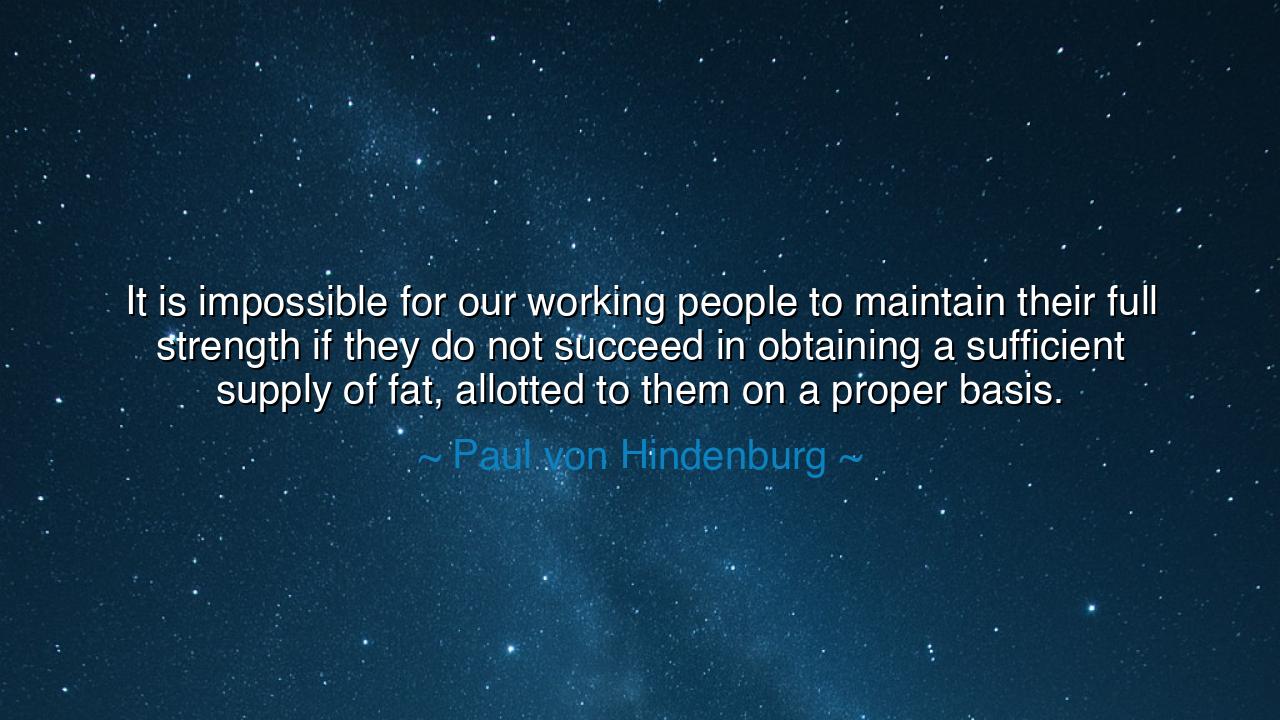
It is impossible for our working people to maintain their full
It is impossible for our working people to maintain their full strength if they do not succeed in obtaining a sufficient supply of fat, allotted to them on a proper basis.






Hear the words of Paul von Hindenburg, the general and later president, who once declared in a time of privation: “It is impossible for our working people to maintain their full strength if they do not succeed in obtaining a sufficient supply of fat, allotted to them on a proper basis.” To some, these words may sound plain, even practical, but beneath them lies a truth as old as mankind: that no society, no army, no nation can endure without nourishing its people. The body must be fed if the spirit is to remain unbroken, and the strength of a people rests upon the simplest of sustenance.
When Hindenburg speaks of strength, he does not mean only the vigor of muscle, but the energy to labor, the endurance to persevere, the ability of workers and soldiers alike to carry the burdens of their time. And when he speaks of fat, he points to the essential fuel of life. In times of plenty, such a statement may seem trivial, but in times of scarcity, fat becomes treasure—energy condensed, a shield against hunger, the very difference between weakness and vitality. Thus his words are born from necessity, forged in the crucible of war and hardship.
The context of his saying lies in the First World War, when Germany faced blockade and famine. The people, once accustomed to abundance, now endured shortages so severe that butter, lard, and oil were rationed as if they were gold. The mighty war machine, though armed with steel and gunpowder, could not function if the workers in the factories and the soldiers at the front lacked the fuel for their bodies. Hindenburg knew that victory was not only a matter of arms but of bread, not only of strategy but of sustenance.
History shows us this same truth in other ages. Napoleon’s armies, mighty and disciplined, crumbled in the snows of Russia not only from cold and resistance but from hunger. The soldiers’ bodies wasted away, for their rations dwindled to nothing. Rome too, in its decline, faced famine that weakened its people and made them prey to invaders. Again and again, history testifies: without nourishment, even the strongest empire collapses. The simplest needs, when unmet, undo the grandest designs.
The deeper meaning of Hindenburg’s words is that the health of a people is the foundation of their destiny. Strength does not come merely from lofty ideals or stirring speeches, but from the daily bread, the portion of food that sustains the laborer, the mother, the soldier, the child. A nation that neglects the nourishment of its working people undermines itself from within. To provide fairly, to allot resources with justice, is not mere policy—it is the very act of preserving life and power.
The lesson for us, O listener, is this: never despise the simple needs, for they are the pillars upon which all greater endeavors rest. Grand visions, lofty achievements, heroic struggles—all fall to nothing if the body falters. Care for your body as you would a temple, nourish it rightly, and it will carry your spirit through trial. Likewise, in community and nation, ensure that none are deprived of the basics, for only then can collective strength endure.
Practical steps are these: in your own life, honor the balance of body and spirit. Do not neglect the food, rest, and care that sustain your strength. In your community, work so that others are not left hungry or wanting, for their weakness becomes the weakness of all. Let justice guide the distribution of resources, remembering that no nation can rise when its workers are starved. And in hardship, remember always that resilience begins with sustaining the body, for from the body’s endurance flows the spirit’s triumph.
Thus Hindenburg’s words, though born of war and want, endure as timeless wisdom: “It is impossible for our working people to maintain their full strength without sufficient supply.” Let them remind us that strength is not only forged in battlefields or parliaments, but in kitchens and fields, in the simple act of feeding the body. For he who feeds his people builds a fortress stronger than stone, and he who neglects them digs the grave of his own power.






AAdministratorAdministrator
Welcome, honored guests. Please leave a comment, we will respond soon